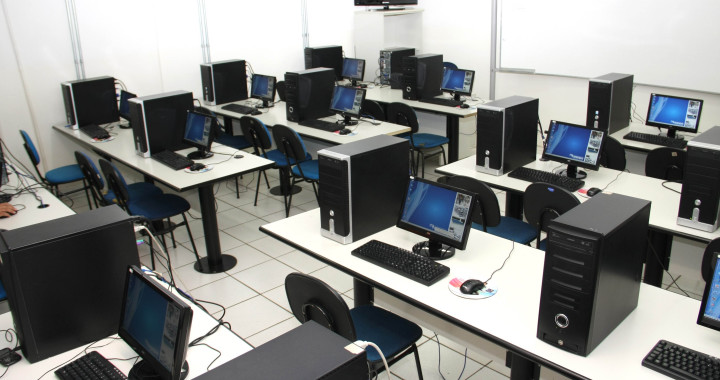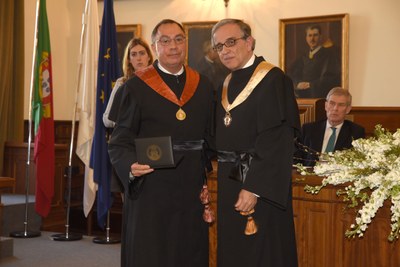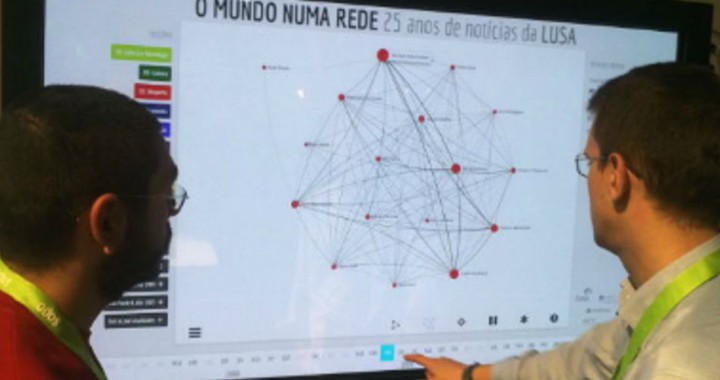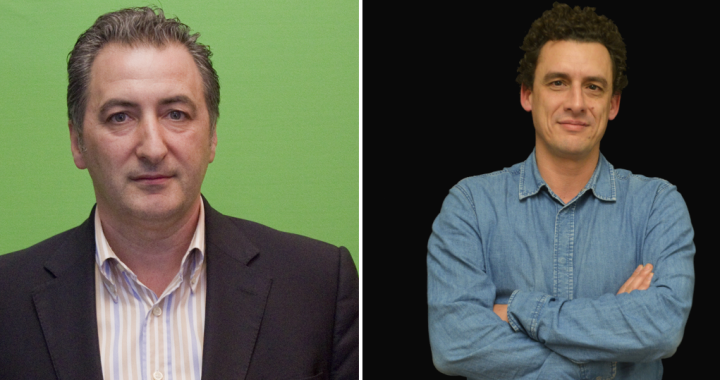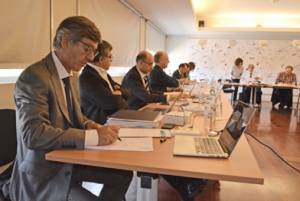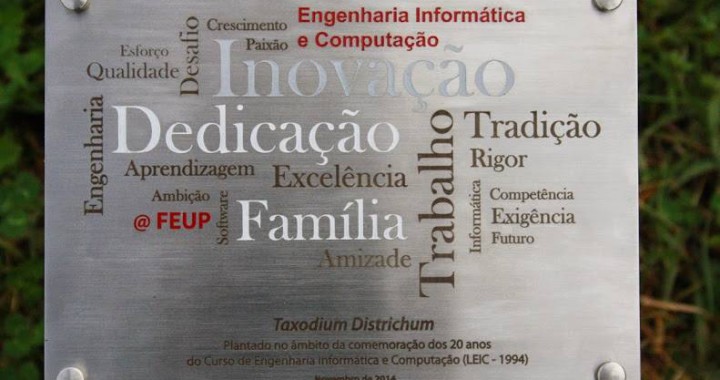According to António Cruz Serra, president of the University of Lisbon, the lack of engineers in Portugal and in Europe is due to lack of computer engineering courses, which can not work around because of the strict rules for hiring teachers and budgetary constraints.
Read the full article in Portuguese
Category Archives: News
Nunes Ferreira as Honorary Professor at the University of Porto
As part of its 105th anniversary celebrations, U.Porto will distinguish jubille and retired teachers who have provided and will be able to continue to make a special contribution to the University. The names of the seven teachers and researchers who will be awarded the title of Honorary Professorat the University of Porto this year are already known.
José Luís Figueiredo focused on teaching catalysis throughout his career, as a professor at the Faculty of Engineering. In addition to being distinguished by the “Stimulus to Excellence” award given by the Ministry of Science and Higher Education and by the Ferreira da Silva 2014 Award given by the Portuguese Chemical Society, several awards at international level. It is following this work that he will be recognized as a researcher at the Laboratory of Catalysis and Materials of the Associated Laboratory LSRE-LCM, in the area of Heterogeneous Catalysis and Carbon Materials.
Joaquim Silva Gomes is recognized for his work as a full professor at the Faculty of Engineering, where he taught in the area of Solid Mechanics, Impact and Experimental Mechanics for over 40 years and for his involvement in the creation of INEGI (Institute of Science and Innovation in Mechanical Engineering and Industrial Engineering), which he chaired for more than 12 years. The professor will have the task of contributing to the consolidation of research in DEMec’s Experimental Mechanics and with the extension of the collaboration with the Eduardo Mondlane University, in Mozambique.
Also full professor at the Faculty of Engineering, Artur Pimenta Alves will be distinguished for the work he developed with the SIFO project “Integrated Services Network for Fiber Optics”, referred to as the basis of INESC TEC. He was director of INESC Porto for nine years and, in 2008, he took over as Director of the Production Center of RTP Porto. To continue its work in this area, U.Porto highlights the development of a national cluster in the area of media.
Raimundo Delgado, after having dedicated 42 years of his life to the Faculty of Engineering, where he was responsible for several disciplines in the field of Structures in Civil Engineering, will continue to develop and seek process improvements for the dissemination of Civil Engineering. U.Porto now recognizes its work as President of the Council of Representatives of FEUP, Director of the PhD in Civil Engineering, President of the Construction Institute and Director of the Laboratory of Seismic and Structural Engineering.
Pedro Guedes de Oliveira also dedicated a large part of his life to the Faculty of Engineering. Full Professor at the Department of Electrical and Computer Engineering (DEEC), his career has also been extended to scientific research and interface institutes. Pedro Guedes de Oliveira has been President of INESC since its foundation, a position he held for seven years. It is based on this professional path that he will be distinguished as Professor Emeritus, and thus be able to contribute to the promotion of the electronics nucleus and his research activities.
With a degree in Electrotechnical Engineering from FEUP in 1972, Fernando Nunes Ferreir began his teaching activity that same year. In addition to having served two terms as Student Ombudsman at U.Porto, in his academic career, the management positions he held within the faculty also stand out, where he was president of the Department of Computer Electrotechnical Engineering (DEEC / FEUP), Director of the Computing Center and Member of the Informatics Engineering Department Council. U.Porto entrusts you with the task of developing the monitoring processes of the academic community.
Finally, Isabel Pires de Lima holds a PhD in Portuguese Literature from the Faculty of Letters, where she is a full professor and researcher. In addition to her professional activity, she dedicated herself to politics, having been Minister of Culture of the XVII Constitutional Government and deputy of the Assembly of the Republic between 1999 and 2008. As Professor Emeritus, she will be in charge of promoting, both nationally and internationally, activities of the Portuguese Culture Study Center.
The seven new Honorary Professors from U.Porto will receive their title on March 22, at the Salão Nobre da Ritoria, during the commemorative ceremony of the University of Porto Day.
Text: REIT
20 years of LEIC
The course of Informatics and Computing Engineering at the Faculty of Engineering of the University of Porto (FEUP) started in the academic year 1994/95. The course started in the form of a Degree (LEIC) from 1994/95 until 2005/06 and went on to become an Integrated Master (MIEIC) from 2006/07. In 2014, 20 years of this course will be completed and, to celebrate it, with the collaboration of the Department of Informatics Engineering at FEUP (DEI), the 20 years of Informatics and Computing Engineering at FEUP are being organized.
The days will take place on the 7th and 8th of November 2014, the week in which an exhibition will also be inaugurated in order to showcase some historical aspects of the course. On the 7th and on the morning of the 8th of November, a series of lectures and panel discussions will take place on pedagogical, curricular, professional and research aspects of the course of Informatics and Computing Engineering at FEUP. The aim is thus to ensure that Computer Engineers trained at FEUP continue to acquire the required skills, with a view to rapid and effective integration into the world of work, as well as constant updating throughout their professional lives.
For this reflection it is expected the participation of prominent personalities in the university and business world in the area of Computer Engineering, former students and professors of the course.
Time Machine in SAPO/U.Porto’s lab and online SAPO
The project has been under development for some time, but it now knows its final and independent form. In addition to a news repository, it is an intelligent network of connections between personalities.
SAPO launches today, November 28, the online platform Time Machine. The name leaves no room for great doubts: it is a tool that allows you to go back a few years to find out what happened at the time. The content is filled with news and the form is defined through the connections between the personalities that dominated the media attention at the defined time.
There are 25 years of Portugal portrayed through 7 million news, most of which belong to the Lusa agency that made the news archive available for the project.
The concept was developed in a partnership between SAPO Labs and the Engineering College of the University of Porto (FEUP). The project was presented more significantly in the 7th edition of SAPO Codebits, with TeK presenting a preliminary phase of the idea.
During the last year, the project evolved in several areas, as explained to Tek by the person responsible for SAPO Labs, Benjamim Júnior. One of the points that has evolved is related to the entry of new journalistic partners in addition to Lusa, which allows access to information in real time. A great effort was also made to optimize the tool so that it works both on tablets and on less capable computer browsers.
Another new feature is the possibility for each user to define a personal page where they can have a more direct access to the information of the personalities who tell them the most.
Project in the area of journalism, research tool, interactive tool or historical social network. Any of the definitions can describe the Time Machine that was already available in another format through the page “Mundo Visto Daqui”.
Benjamim Júnior prefers to talk about a democratization of information. “The Time Machine is a sophisticated tool for information professionals and for all people”. One of the goals of the online platform is to be able to turn files into something that is not boring, because “it takes courage to send ourselves to some files”, confessed.
The users can search for an event by data or by the person who marked that time. Benjamim Júnior highlights an event – the death of Ayrton Senna in May 1994. When a research falls on personalities, a network of links is presented with other elements that share media references at the time and that may even be related to the news. In the case of the death of the Formula 1 driver it is the names related to motorsport that appear in the “web”.
“This type of information conveys an emotional connection, it brings back memories. The name Time Machine is emotional ”, reveals the coordinator of SAPO Labs in conversation with TeK.
The entire research process is done automatically and generated by computers. Behind the Time Machine, there are many other aggregated projects that can continue to evolve from here.
Currently SAPO Labs is also developing ideas in terms of video classification, treatment and analysis of social networks and projects in the educational area.
António Lucas Soares is one of the new coordinators of the Center for Enterprise Systems Engineering (CESE) of INESC TEC
Américo Azevedo and António Lucas Soares are the new coordinators of the Center for Enterprise Systems Engineering (CESE) of INESC TEC. The researchers start to secure the positions that previously belonged to Jorge Pinho de Sousa and Luís Carneiro, now an Administrator at INESC TEC.
Américo Azevedo, associate professor in the Department of Engineering and Industrial Management at the Engineering College of the University of Porto (FEUP), concluded in 2000 his doctorate in the area of collaborative planning systems. He was and is still currently in charge of several national and European research projects, including Adventure, VFF – Virtual Factory Framework, CORENET or oAPPS4aME, among others. He has been a collaborator with INESC TEC since 1993.
António Lucas Soares, associate professor in the Department of Informatics Engineering at FEUP, teaches Information Systems and Information and Knowledge Management. In addition, he is director of the Master’s in Information Science at the University of Porto (FEUP / FLUP). Some of the projects he has been involved in at INESC TEC, where he has been collaborating since 1993, include H-Know, cogniNet, and oRCED, among others.
Asked about the new challenge of leading the CESE, they said that they are “aware of the enormous challenge that lies ahead”. However, the knowledge and experience they have of the CESE’s environment, in particular the high experience and commitment of the entire team, simultaneously provides them with “comfort and confidence in the design and implementation of the Center’s strategy for the next three years”.
The coming times seem “challenging because of the many projects that are now starting, but also because of the countless opportunities that the target sectors of the CESE promise to provide. The aim is for an CESE to capitalize its interdisciplinary identity and culture in strategic collaborative bets with other INESC TEC centers and with international reference entities. Scientific excellence and the recognition of the business community will be the motivation for all initiatives that should result in innovative systems and services for the Company, the central object of the CESE’s scientific and technological intervention, ” affirm the new coordinators.
The INESC TEC researchers mentioned in the body of the news are linked to INESC TEC and FEUP.
INESC TEC, February 2016
Gabriel David in INESC TEC’s Administration board
INESC TEC’s General Council elected a new management, named INESC TEC’s Board of Directors (CA). The Board, which replaces the previous Board, is composed of the President and eight Directors, establishing a pioneering governance model among the Associated Laboratories in the country.
In a statement to INESC TEC employees, President José Manuel Mendonça states that “this change in the governance model of INESC TEC is related to the will to introduce a necessary generational renewal in our management bodies, combined with an essential period of ‘ passage of testimony ‘”.
INESC TEC’s Board of Directors is made up of José Manuel Mendonça (President), Mário Jorge Leitão, João Peças Lopes, Vladimiro Miranda, Luís Carneiro, Gabriel David, João Claro, Bernardo Almada Lobo and Rui Oliveira (Administrators).
An Executive Committee was chaired by José Manuel Mendonça, whose Executive Directors are Mário Jorge Leitão and Luís Carneiro.
At the General Council meeting on the 8th of June, changes were still decided in the Scientific Council, with the entry of new members: Lia Patrício, João José Pinto Ferreira and João Barroso as new members. Manuel Matos maintains the position of President.
The table of the General Council also undergoes modifications. Rosário Gambôa, President of IPP, becomes First Secretary. The President of the General Council, Sebastião Feyo de Azevedo (Rector of U.Porto), and the Second Secretary, António Ferreira (FEUP), hold the same positions.
These changes in the Associative Bodies do not modify INESC TEC’s mission to serve as an interface between the academic world and the business world of industry and services, as well as the public administration. U.Porto also maintains the status of majority member of INESC TEC (INESC and the Polytechnic Institute of Porto are also members).
Raul Vidal is the personality of the year in Software Engineering
Raul Vidal, professor at the Engineering College of the University of Porto (FEUP), will receive the Personality of the Year award in Software Engineering on the 29th of June, at 2:30 pm, in the auditorium of PT Inovação, in Aveiro. The ceremony takes place within the scope of the International Conference “Trends 2015: Quality in Software Development and Services”, organized by INOVA-Ria.
The stage chosen for the awarding ceremony of Professor Raul Vidal brings together a set of personalities with connections to the universe of new technologies and software quality, an area in which the Director of the Department of Informatics and Computers Engineering at FEUP has always valued. The attribution of the 2015 Personality of the Year award in Software Engineering to the professor at FEUP is due “to his commitment and leadership in this matter of great importance for the TICE sector and for the national economy as a whole”.
With a degree in Electrical Engineering from FEUP in 1972, Raul Vidal continued his studies in England, completing his Master’s in 1974 and later his PhD, both at UMIST in Manchester in 1978. His professional interests have always been linked to the area of software quality, improvement of software processes, human factors in software engineering and entrepreneurship and innovation.
Member of the FEUP Software Engineering R&D Group, which he founded and led until 2008, Raul Vidal has participated in several national and international R&D projects. Co-founder in 2009 of Strongstep, spin-off of the Engineering College, in the area of process improvement and software quality. Between 1986 and 1998, he developed R&D activities at INESC TEC, being responsible for SIRTE projects and Telephone Central Supervision Networks, having even founded in 1990 the Software Engineering group, which he led and where he was involved in several R&D projects.
From May 1992 to December 1995, on behalf of the Rectory of the University of Porto, he coordinated the participation of R&D institutions in the Northern Region of Portugal, within the scope of a RECITE project, involving the regions of Bavaria, Northern Portugal, Seville and Valencia. From May 1988 to December 1992, he was an effective national delegate in the European community’s DELTA program. At the express invitation of CCE, he joined the “Requirements Board” of the program, having also integrated the group of experts who carried out its reevaluation and the panel of evaluators who carried out the final evaluation of the projects approved in the respective exploratory phase.
Raul Vidal was one of the main facilitators and coordinators of the process of creating the Master’s Degree in Electrotechnical Engineering and Computers at FEUP in 1986. He was the facilitator and coordinator of the process of reformulating the study plan for the Degree in Electrotechnical Engineering at FEUP in 1987, the same happened with the creation process of FEUP’s LEIC in 1992/1993. He was also coordinator of the edition of MEEC held in 1990/1991 at the University of Madeira and one of the main facilitators of the process of creating the Degree in Systems and Computer Engineering at the University of Madeira, in 1994, of which he was pedagogical coordinator until 1998.
He is currently Director of the Computer Engineering Department at FEUP and Associate Professor, integrated in the disciplinary and R&D area of Software Engineering. Elected member of the General Council of the University of Porto in July 2013 and member of the Scientific Council of FEUP, since July 2014. Since February 2015, he has integrated, as Senior Advisor, the Service for Support to Business Partnerships (SAPE) of INESC TEC .
He is a senior member of the IEEE, a member of the Software Engineering Institute (SEI) at Carnegie-Mellon University, and a senior member of the Order of Engineers (Computer Engineering School).
Digital Media: FEUP student awarded in Sweden
Regarding the Music Tech Fest Scandinavia 2015, which took place on the 29th and 30th of May, in Sweden.
A project developed by Horácio Tomé Marques, a student at the Engineering College of the University of Porto (FEUP), of the Doctoral Program in Digital Media, UT Austin Portugal, was one of the winners of this year’s edition of the MusicBricks Incubation Awards, delivered last May, in Sweden, during the Music Tech Fest Scandinavia 2015.
The FindingSomething SoundingBonding project, created and produced by Horácio Tomé Marques, Francisco Marques Teixeira and Fanny Fazakas (Hungary) at Hackathon – one of the existing modalities at the Scandinavian festival – allowed them to stamp a Blue Vinyl Award, after having created and developed this project within 24 hours, respecting a series of parameters linked to the MusicBricks structure.
The jury surrendered to the audiovisual performance piece for two actors who expose a narrative conceptually anchored in an inter-relational event between two human beings (a kind of game based on provocation / perception, with gestures, body expression, reception / perception / brain reaction/ iteration as ingredients). In terms of processes and technologies, Horácio Tomé Marques’ project is based on gestures / movements and electrical potentials of the brain, where one participant uses several R-IoT gesture / movement sensors (IRCAM) and the other uses a brain-computer interface (Emotiv).
These interfaces (BCI – Brain Computer Interface) are devices that allow to capture the electrical phenomena of the brain and, supported by specialized software, to transcode them into discrete (digital) data. These can, in turn, after treatment – filtering, statistics, etc. – be used to denote (passive systems) phenomena such as emotions, or to control (active systems) events or mechanisms. They are, for example, an emerging technology in games, where they have served as actuators (game control). In other words, they allow you to play with impulses generated in the brain, replacing (or complementing), for example, joysticks.
The doctoral research of Horácio Tomé Marques, Music, Reason and / or Emotion, is based on a multidisciplinary project that proposes representations – eg, visual, sound, multi-sensory narratives – in real-time analysis of electrical phenomena of the brain, through the use of brain-computer interfaces (BCI). It implements innovative approaches to the representation of the action / perception / reaction processes, especially the proportional ratio, between reason and emotion in the context of the performing arts, especially music. It is an artistic research project, but strongly based on frameworks of theoretical reference and experiences in the areas of neuroscience, neurotechnology and computer science.
The Porto researcher’s project was presented and awarded during the Music Tech Fest Scandinavia 2015, which took place on the 29th and 30th of May, in Sweden. Following this winning performance, the PhD student at FEUP was invited to participate and present, together with his colleagues, the development of the project at the next Music Tech Fest, which will take place in September, in the city of Ljubljana, Slovenia.
About MusicBricks
The MusicBricks incubation awards are incentives for the continuity of research and development, configured by grants of 3000 euros that reward innovative, well-founded projects, which show a research history and which have a clear potential for future evolution and will have an effective impact on fields of arts, science and technology.
In Portugal, there is a lack of 5000 informatic engineers
According to António Cruz Serra, Dean of the University of Lisbon, the lack of engineers in Portugal and Europe is due to the lack of courses in Computer Engineering, which is not possible to circumvent due to strict rules for hiring teachers and budget restrictions.
In an interview with “Económico”, António Cruz Serra, Dean of the University of Lisbon spoke of some essential points of higher education in Portugal and of the challenges that education faces, namely, in responding to the needs of the labor market.
As explained by the Dean, the Director of Microsoft Portugal revealed some concerns, namely, with the shortage of around 5,000 computer engineers in Portugal, a number that in Europe amounts to 500 thousand.
To combat this need, the only solution would obviously be to increase training in this area, however, Universities do not have the capacity to receive more students, since there is a huge barrier that prevents the hiring of more teachers: budget restrictions and the strict hiring rules themselves.
To set up a new course, in which we receive 100 or 200 students, will demand intensive work, because it is not the same giving theoretical classes to 200 students. We must have installed capacity. We need to make hires that violate the rules that prevent hiring itself.
Still in the same interview, António Cruz Serra, states that ways should be found to put more people to study in universities, even if not in “expensive courses”, according to him, there is “certainly the capacity to have more people in higher education and to model what the training offer is from the point of view of training costs ”.
New website launch!
DEI will soon launch a new web page completely redesigned and with very useful content
